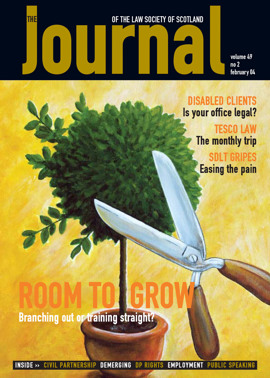Parallel imports: putting on the brakes
The rights of pharmaceutical trade mark owners against parallel importers have been further strengthened. The Inner House judgment of 15 January 2004 in Boehringer Ingelheim v Munro Wholesale Medical Supplies upheld an interim interdict preventing sales by Munro of re-boxed 30 capsule packs of BI’s product trademarked “Spiriva”.
Munro had claimed to be entitled to re-box 60-capsule packs of Spiriva imported from Germany into 30-capsule packs because otherwise they would not have effective access to the market or a substantial part of it, being the market for 30-capsule refill packs. They relied on alleged “well established medical prescriptive practices based, inter alia, on standard sizes recommended by professional group and sickness insurance institutions”, a factor cited by the ECJ in Boehringer Ingelheim v Swingward [2003] Ch 27 at para 47 as possibly providing an impediment hindering effective access; and on material indicating that 80% of Spiriva prescriptions in Scotland in a five month period were for single 30-capsule packs.
On the Scottish test for interim interdict the court may have regard to the relative strength of the parties’ cases in assessing the balance of convenience. However the appeal court took the view that Munro had not shown they were very likely to succeed at the end of the day. The statistics did not provide compelling prima facie support for a well established practice in the requisite sense which hindered effective access to the market by importers of 60-capsule packs.
This was partly because for most of the relevant period 60-packs were simply not available. The court indicated that the prescriptive practice must “causally have a practical inhibiting effect on access to the market of refill 60-capsule packs”. It remarked: “No doubt the marketing of familiar 30-packs would initially be an easier task and thus a preferred course for the parallel importers”, a possible reference to the European authorities and in particular Swingward which held that the trade mark owner may oppose re-packaging based solely on the parallel importer’s attempts to secure a commercial advantage.
This is a robust and straightforward decision which, although at interim stage, sets a helpful precedent for pharmaceutical trade mark owners. It should at least prevent parallel importers relying on the mere fact that the owner sells in a certain pack size in a certain market as entitling them to re-box to sell that particular size. The decision helpfully cuts through the conflicting and ever evolving European and UK case law and gets to the heart of the matter. Arguably it will help trade mark owners to establish that certain acts by parallel importers, claimed to be necessary to give effective access to a market, are purely commercially driven and in reality based on an attempt to ride on the back of the brand and reputation built up by the trade mark owners.
Gill Grassie, Head of IP and Technology Department, and Robert Buchan, Senior Solicitor, IP Litigation, Maclay Murray & Spens
In this issue
- It's a funny old world
- Making the ends of justice meet
- Training for growth
- All the grocer's grandchildren
- Radical change or a lie in law?
- Costing the job
- Are you listening?
- Much ado about nothing?
- Demergers and continuing cover
- Bond with the audience
- Many roles, one team
- Fee sharing: making the rules work
- On sentencing
- Credit reform by instalments
- Scottish Solicitors' Discipline Tribunal
- Show us the evidence!
- A new era for farm tenancy law
- Fathers' rights: a new UK postcode lottery?
- Parallel imports: putting on the brakes
- Website reviews
- Book reviews
- SDLT 1: Over the obstacle course
- SDLT 2: Personal presentation
- The new law of real burdens
- Housing Improvement Task Force






